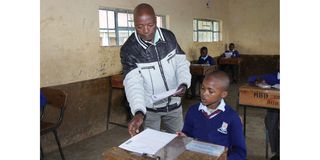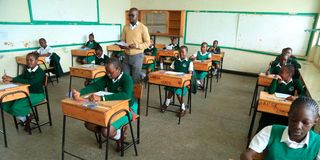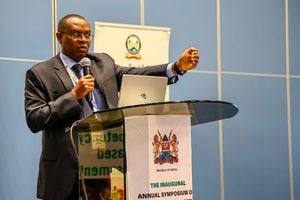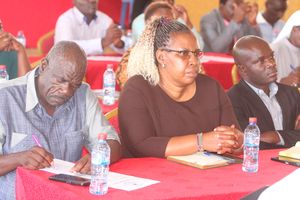
Pupils sit Maths assessment of the Competency Based Curriculum at Arya Primary School in Kisumu on September 17, 2019.
A new Bill that is to be presented to Parliament proposes radical changes in the management and administration of national examinations and assessments as implementation of the competency-based curriculum (CBC) continues.
The Kenya National Educational Assessments Council (KNEAC) Bill 2025 proposes an overhaul of testing learners to usher in technology such as electronic marking, AI-powered scoring, real-time assessments, and tougher penalties for cheats.
Marking of some national assessments will shift to digital platforms, with approved centres using a conveyor-belt system where different assessors handle separate sections of a script to ensure objectivity. Artificial intelligence will assist in scoring, particularly in multiple-choice and structured questions, speeding up the process and enhancing accuracy.
“The council shall develop guidelines and tools for marking and scoring formative and summative assessments including oral, aural, practical, projects, practicum or any other mode of assessments. The council may, from time-to-time, implement the following methods of marking and scoring: pen-and-paper marking, e-marking, electronic capture of marks, automated marking (automark), optical mark recognition (OMR), AI-based marking and; any other marking or scoring method deemed appropriate,” the Bill reads, in part.
The amendment Bill was part of the recommendations of the Presidential Working Party on Education Reforms (PWPER) and it also proposes a change of name from the Kenya National Examinations Council (Knec) to reflect the new mandate for the council.

An invigilator distributes question papers to Grade six learners at Michinda Boys Day and Boarding School in Elburgon, Nakuru County during the Kenya Primary School Education Assessment on October 28, 2024.
The Bill further proposes that individuals found in possession of examination materials before or during the assessment face up to ten years in prison or a fine of up to Sh2 million, or both, and those who assist others in unlawfully obtaining or sharing assessment information via social media or other platforms will also face penalties of up to five years' imprisonment and fines reaching Sh5 million.
“A person who, having in his or her possession or under his or her control any assessment paper, material or any information relating thereto, negligently or wilfully loses such assessment paper, material or such information, or uses such assessment paper, material or such information in a manner prejudicial to the proper and fair conduct of any assessment, commits an offence and is liable, upon conviction, to imprisonment for a term not exceeding five years, or a fine not exceeding Sh1 million, or to both,” it reads.
“A person who wilfully and maliciously damages assessments material or facilities, or any evidence that could have led to a conviction under this Act, commits an offence and is liable, upon conviction, to imprisonment for a term not exceeding five million shillings, or to both”.
The amendments also attempt to punish individuals who hold fake certificates under the purview of the council. Consequently, it proposes that a person who presents a forged certificate or diploma, result slips or statement of results or someone else's certificate or diploma, result slips or statement of results purporting it to be hers or his, to a prospective employer or to an institution of learning with intent to gain employment or admission or any other purpose commits an offence and is liable, upon conviction, to imprisonment for a term not exceeding two years, or a fine not exceeding Sh1 million, or both. Further if passed into law, the council will have the power to process and release results autonomously and issue certificates within 12 months — a move set to ease the anxiety many learners face post-exams.

An invigilator distributes question papers to Grade six learners at Michinda Boys Day and Boarding School in Elburgon, Nakuru County during the Kenya Primary School Education Assessment on October 28, 2024.
“The council shall issue certificates and diplomas to qualified candidates within twelve months of the release of the assessment results. The certificates or diplomas, once issued by the council, shall not be withheld from the candidate by any person or institution,” read the bill.
Recently, the Ministry of Education issued a directive to all school principals to release certificates belonging to former students that they hold for non-payment of fees or other reasons.
The new proposed changes will create KNEAC, a new body that will oversee all assessments from basic to post-school teacher education levels. To enhance a smooth transition, the Bill proposes that Knec continues for two months after the adoption of the amendments.

An invigilator distributes exam materials during the Kenya Primary School Education Assessment at Aga Khan School in Kisumu on November 1, 2023.
“The former council shall continue in office for a period of not more than two months from the effective date as appointments are made to the council and the former council shall for all intents and purposes be deemed the council appointed under this Act. Despite sub-paragraph (1), the former council shall not, while in office by virtue of subsection (1), make any appointments to any office of the Kenya National Educational Assessments Council Bill, 2025 Council under this Act,” it reads.
The Bill is one of the 11 that the ministry has prepared to effect recommendations of the PWPER made in June 2023. However, many of them are behind schedule as they were made alongside specific timelines.












